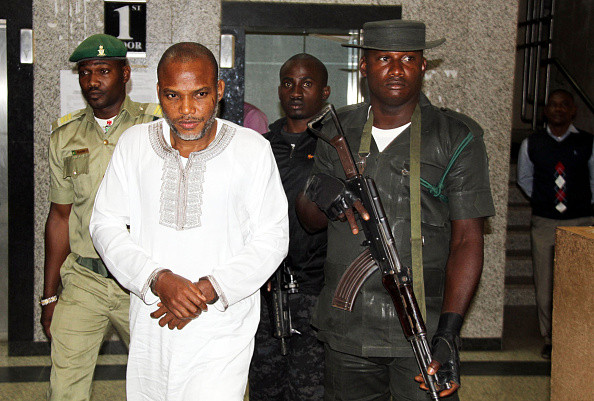Nigeria: Pro-Biafrans urged to create Biafra United Front to achieve independence

Pro-Biafran activists in southeastern Nigeria have been urged to create a Biafra United Front to continue their struggle for independence and defend themselves against Nigeria's alleged violence. The Washington-based Organisation of Emerging African States (Oeas), which fights to achieve "true freedom" in Africa, is now calling on all pro-Biafran groups to put aside their internal differences and come together to achieve independence.
Pro-Biafrans call for the independence of the Biafran territories forcibly annexed to Nigeria during the British colonisation, which ended in 1960. They hold regular marches across the country's southeast calling for a breakaway and the release of their leader Nnamdi Kanu, head of the Indigenous People of Biafra (Ipob).
"On 4 December 2015, the Oeas issued the following demands to the Nigeria government to be met within 90 days," a document seen by IBTimes UK reads. " Immediate release from jail of Biafra Zionist Movement, MASSOB, Ipob and Radio Biafra supporters, including Benjamin Onwuka and Nnamdi Kanu. All federal military and police forces to stand down and return to their barracks. A snap referendum on Biafran self-determination to be held within 90 days."
However, Oeas claimed the Nigerian government ignored the requests and instead resorted to jailing more pro-Biafrans and using excessive violence against protesters.
"Therefore, the Oeas calls for the creation and implementation of a Biafra United Front to use all necessary means to achieve these goals," the document continued. "The Oeas offers its good offices to put out a call for the creation of a united front and organising meeting of all groups in greater Biafraland."
The Nigerian government has always maintained that Nigeria's unity is a priority for the country and that although peaceful pro-Biafran protests are welcome, demanding the breakaway of the Biafran territories is against the constitution.
The government also told IBT that it does not consider the separatist movement a threat to the current leadership, and defined pro-Biafrans as an "insignificant number of frustrated people who are not a threat to the existence of Nigeria".
Allegations of violence
Oeas's call came days after Amnesty International told IBT that the Nigerian security forces had used excessive force against pro-Biafran protesters.
It is believed that during one of the latest demonstrations held in Aba state on 9 February, at least 10 people were killed by the army and police, with footage purportedly showing Nigerian security forces attacking pro-Biafrans being widely circulated on social media.
However, the spokesperson for Nigerian defence, Rabe Abubakar, told IBT the police and army did not kill the demonstrators. He also said security forces had to intervene as some pro-Biafrans were allegedly carrying weapons.
In several interviews with IBT, the army and the police have denied allegations of violence during pro-Biafran protests, arguing that security forces had to intervene as pro-Biafrans "were armed and disrupted peace in the state".
The declaration of the Independent Republic of Biafra in 1967 sparked a civil war that resulted in the death of millions and the re-annexation of the republic to Nigeria in 1970.
Nigeria up close: Check out our Flipboard magazine
© Copyright IBTimes 2025. All rights reserved.






















